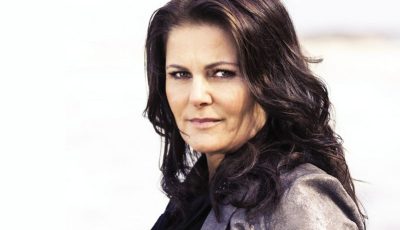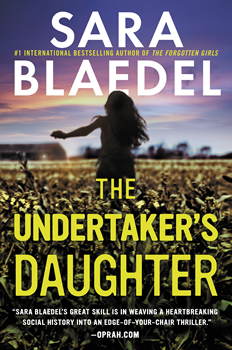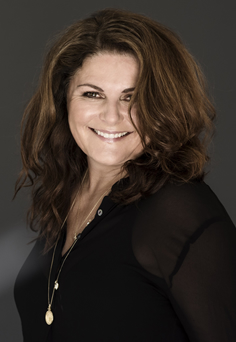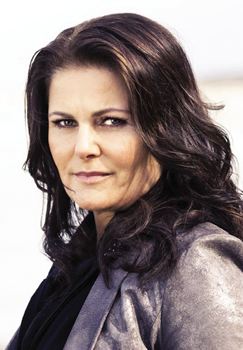

International Thrills: Sara Blaedel
 By Layton Green
By Layton Green
During a recent book festival in Winston-Salem, North Carolina, I was chatting to a fellow author on the way to dinner. I discovered through conversation that she was a Danish crime writer named Sara Blaedel, but she was so humble that it was not until I Googled her work that I discovered she was the Sara Blaedel—quite literally, the most popular author in Denmark, and a No. 1 international bestseller. She’s the only author to ever win the Martha Prize (The Danish Reader’s Favorite Author award) four times, and in 2014, she won Denmark’s most prestigious literary award, the Golden Laurel.
Sara was on tour in Winston-Salem to promote the release of a brand-new trilogy that is somewhat of a departure from her popular Louise Rick series. In this interview, we discuss her past work and a tough period in her life that inspired the new direction, the life of a bestselling Danish crime novelist, and other topics. I hope you enjoy, and please check out Sara’s work!
Thanks for taking the time to chat, Sara. This column is all about focusing on the world’s best international crime writers, and our readers love to learn where the authors call home. Can you tell us a little bit about your background?
I am a native of Denmark. My writing career started in journalism and TV production. I founded a Danish publishing house 26 years ago; I published only crime fiction. I’ve always been a huge fan of the genre, though it was not particularly popular yet in Denmark when I started my press.
How did you get your start as a writer? Did you have a “big break”?
I was working as a journalist and in TV production. I’d always loved crime fiction, but never believed I would actually go in that direction. Once I took the plunge, I didn’t believe it would lead to anything, but was so pleasantly surprised. My first book was well-received but quietly. It was my second that enjoyed the big breakout. I was ecstatic and am still filled with appreciation and excitement.
You are the No. 1 most popular crime novelist in your country—has crime always been a popular genre in Denmark? I know “Scandinavian Noir” has really taken off internationally—is there a large cadre of crime novelists working in Denmark today?
While crime fiction has been captivating me for almost as long as I can remember, it was not a big draw in Denmark until Swedish noir really took off. That enormous success was contagious in Scandinavia as with so much of the rest of the world. Now, there are numerous super-talented crime novelists writing and working in Denmark. Which is so fabulous!
How has life changed for you as a bestselling author?
The big change came for me with becoming a full-time writer in 2005. What a thrill that was! My working life could be completely dedicated to my books and all that goes into them (planning, research, development, etc.). I was terrified about leaving my day job; it was very risky to walk away from my TV career. I’m not the best multi-tasker, and, of course, as a storyteller, I wanted to be at my best. I yearned to be able to focus intensively.
The rewards were huge. First and foremost was the joy of being home with my son. I loved that! Working from home and being there for him and available to go on school trips or to comfort him when sick was wonderful. Once I turned that corner, I knew it would be nearly impossible to go back to working outside my home.
Another great result of achieving bestseller status is being invited to book festivals. That started, for me, in Europe. It was strange but incredibly thrilling to be noticed by readers, and to have people writing about me and to me. Having people in Italy reading about and discussing Louise; well, that was simply beyond my wildest dreams.
I did not expect this kind of success, which took some time to sink in. I am profoundly grateful to all my readers, editors, publishers, and the incredible teams who make it possible for my books to get out to the world. I know how fortunate I am.
What part of writing a crime novel do you find comes easiest? What about the most challenging?
Researching and plotting are extremely time-consuming (I am obsessive about details and capturing authenticity). These tasks can be difficult but I enjoy every bit of delving into them. Because of my journalism background, engaging in research feels natural to me. And, of course, I’ve had help from so many wonderful people.
I think my greatest challenge as an author came in the conceptualizing of a trilogy from the start. Unlike my experience with my other books, I didn’t start out with the idea that they’d be part of a series. I was certain that THE UNDERTAKER’S DAUGHTER, from the get-go, would be told in three separate volumes. Which means the pressure is on, as every bit of the storytelling must thread through from book to book, building and connecting.
Which writers (at home or abroad) have influenced you the most?
I fell madly in love with the mystery genre as a child, reading the truly extraordinary works of the great Enid Blyton. The Famous Five series opened up a whole world to me. I was not only a witness and viewer, but a participant in her stories in which I became lost and grew completely involved. I was addicted to the suspense; just captivated by it. As I was drawn in, I saw myself as being part of an integral part in the solving of the cases. I have a special place in my heart for Ms. Blyton and other children’s mystery writers.
I’m a huge Michael Connolly fan. I’m crazy about his hardboiled, set in L.A. storytelling. I love his Harry Bosch series! And Karin Slaughter is a master of plotting. Whether in her series or standalones, she’s so efficient; she leaves no stone unturned.
Before we discuss THE UNDERTAKER’S DAUGHTER, which is the first novel in a new series, could you quickly provide our readers with a snapshot of your other series? What type of readers will love your work?
At the center is Louise Rick, a strong female protagonist. Readers who are drawn to savvy, smart, capable, independent women who are human and therefore imperfect (regular people with strengths and weaknesses) will find Louise appealing.
When I began writing Louise, I was focused on police procedural, but then I moved her to the missing persons bureau. I’m intrigued by and drawn to the searches and the exploration of what happens to those who vanish.
THE UNDERTAKER’S DAUGHTER is a fantastic novel. And what a great title! The book is about a Danish school portrait photographer who, after traveling to Wisconsin to help settle her father’s will, stumbles upon an unsolved murder and ends up investigating a killer. Is this type of “amateur detective” a departure for you? How is it different from writing a police procedural, like the Louise Rick series, featuring professional law enforcement officers?
The whole writing experience was very different in many ways. As Ilka is not a detective, she’s not working to solve cases or taking an inherently curious, skeptical, or fact-finding approach to near every move she makes. Instead, she finds her life first upended, and then gets caught up unwittingly in something that has deceptive and ultimately explosive and even dangerous elements.
I don’t think of Ilka as an amateur detective at all. She’s not working anything, but rather trying to understand the strangeness that is coming to the surface around her. She discovers secrets about her past and her father, and realizes it is her arrival that brings these details to light. She’s in the middle of a worrisome and unexpected situation; she’s struggling to make sense of it all, and to figure out how what she learns connects to her own life.
I found the Acknowledgments section at the end very moving, when I learned that the idea for the novel came after both your parents died within three days of each other, and a kindly undertaker helped guide you through the funeral process. You seem like a very empathetic person, which is one of the many reasons, I am sure, your writing resonates with so many readers. Did writing the book help you get through that tough period in your life?
Writing this story helped me to heal, without question. In many ways. But I can’t say that it got me through that profoundly tough time as I wrote it years after the loss of my parents. Revisiting that tough period in my life proved enlightening and, in some ways, therapeutic. It allowed me to make sense of things, and to find some peace.
Anything else you care to tell us about the actual undertaker who served as the inspiration?
These people were absolutely remarkable. I was new to the whole industry and need for services, and, of course, I was grieving. I was struck by this incredibly special woman, and the strikingly comfortable and natural way that she handled everything—from the preparations to the surviving loved ones. In Denmark, it’s still taboo to talk about death and loss, and so this was genuinely a breath of fresh air. A bright spot that resonated and touched me so deeply during a terrible time. She brought a high level of respect, dignity, and sensitivity to all that she did. Like a brilliant craftsman or baker with innate understanding like a sixth sense.
Even her then 20-year-old son, who worked for the family business, was wonderful. He drove the hearse, and was lovely and charming, and had clearly inherited his mother’s grace.
Is this your first novel set mostly in the United States? Did you find it hard to feature a foreign setting?
This is my very first storytelling that is primarily set in the U.S. I was excited about the new direction, but also worried about whether my Danish readers would be willing to embrace the change. They did, and I’m delighted.
I chose Racine, Wisconsin, because of its sizable community of Danish immigrants and heritage. Ilka was going to be leaving her home in Denmark to travel to the States, to where her father had settled. It was important for me that I find the region where he would have wound up. After a great deal of research, I traveled to Racine, where I was thoroughly enchanted by the people and how they’ve brought elements of my homeland to life here.
How much research did you perform on United States police procedure? Did you find any major differences between the States and Denmark?
Research plays an imperative and massive role in my writing. I dig in to explore and discover details about virtually every subject included in my storytelling. I read and study, travel to the very locations I employ, and spend time interviewing and trailing experts in the fields I include.
What I found particularly fascinating were the differences in how undertaking is handled between the two countries. Here in the States, funeral homes take care of not only the preparations for the deceased’s burial but also the ceremony (oftentimes with multitudes of mourners paying tribute) and the care of the grieving survivors. I learned that the laws and regulations for undertaking vary state-to-state. I became entrenched in how things are done in Wisconsin, and why. It was a truly compelling subject to study and zero in on.
What about the publishing process—how do the two countries differ?
The only thing that’s really different, the size of the industries aside (the U.S. publishing marketplace is huge), is that every bit of the process takes longer here. In Denmark, it is only months between submission and publishing.
What are you reading right now?
I’m loving making my way through The Wife by Alifair Burke, and looking forward, eagerly, to the new Karin Slaughter standalone—Pieces of Her.
What do you like to do when not writing?
I love little more than sitting in my summer house, watching the ocean. I’m passionate about traveling, and always trying to convince my 21-year-old son to go with me.
Do you have any advice for new writers?
Most important, character development: get to know the characters.
They must come fully to life, to speak to me first so I can envision and believe them.
What’s coming next from Sara Blaedel?
I cannot wait for the releases of the second and third in The Undertaker’s Series. I’m loving every minute of working on this trilogy, which has been life-changing for me.
- International Thrills: James Wolff - June 30, 2018
- International Thrills: Sara Blaedel - April 30, 2018
- International Thrills: Ramón Díaz Eterovic - November 30, 2017


